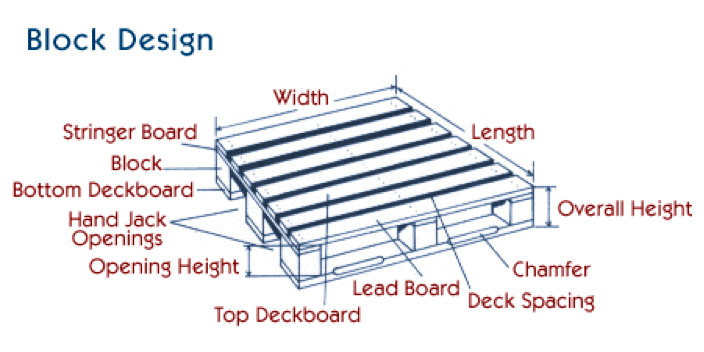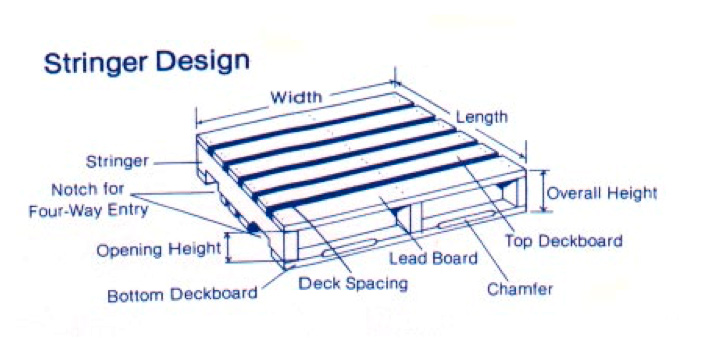Palletology
An Introduction to Wood-Pallets
2-way Wood Pallet
Pallet or skid accessible only from the front and back.
4-way Wood Pallet
Pallet or skid accessible from the front, back and sides via notches in the stringers.
Banding Notch
Also called a strap slot or strap notch. Recess or cut-out in the upper edge of the stringer or the top or bottom pallet deck, designed to allow tie-down of a unit load to the pallet deck with strapping or banding.

Block Pallet
A type of pallet with blocks between the pallet decks or beneath the top deck.
Box
A container or case, usually rectangular (for our purposes, made of wood).
Chamfered Deck Boards
A deckboard with the edges of one or two faces beveled, either along the full or specified length of board, or between the stringers or blocks facilitating entry of pallet-jack wheels and forks of forklift trucks.
CAD ©
computer-aided design software for the design of the best shipping box or crate for the job at the best value.
Connection
The structural junction of two or more members, components, or assemblies, designed to be assembled with mechanical fasteners, adhesives, welds or interlocks, or a combination of them, to transmit structural forces safely; often identified by location within the pallet as end connection, center connection, or corner connection. Colloquially, the term “joint” is used in place of the term “connection.”
Deck
Top or bottom surface of the pallet, consisting of one or more boards or panels, with or without space between the elements.
Crate
Slatted wood box or framework for packing, shipping. (Or, a completely enclosed boxlike packing or shipping crate.)
Deckboard
A single element or component of a pallet deck, oriented perpendicular to the stringer or stringerboard.
Deflection
The amount of flexural deformation of a pallet or pallet component due to the weight of an imposed load; sag.
Flush Pallet
A pallet with deck boards flush with the stringers, stringer boards or blocks along the ends and sides of the pallet.
Four-Way Block Pallet
A pallet with openings at both opposite pallet ends and sides sufficient to admit hand-pallet jacks; full four-way entry pallet.
Grocery Pallet
A generic reference to the pallets used in grocery manufacturing, distribution and retailing; historically, it meant “GMA pallet” which was a pallet originally specified by the Grocery Manufacturers Association.
Hardwood
A wood from broad leaved tree species commonly used for wood pallets. Dense Hardwood i.e. would be Oak or Maple and Soft Hardwood examples would be Aspen and Basswood.
Heat Treated
Wood that has been heated in a kiln until it has achieved a minimum core temperature of 56 degrees Celsius (132.8 Fahrenheit) for 30 minutes minimum.
Inset
Refers to when deck board ends are placed inside (the middle) of the top of the stringers (not flush). Very often it’s done to allow a corrugated protective box to be placed over the cargo so the box sits on the stringer ends, then the box can be stapled to the ends of the stringers.
Length
Refers to the stringer or stringer board length; also refers to the first dimension given to describe a pallet, i.e., 48″ x 40″, where 48″ is the pallet stringer or stringer board length.
Kiln Dried Heat Treated
For lumber that is Kiln-Dried Heat Treated, the wood is dried in giant kilns at the mill with carefully controlled temperature and humidity levels. The goal is to drive moisture out so the boards dry quickly and evenly to prevent warping that could render the wood unusable. Kiln Dried Heat Treated lumber also has much lower moisture content vs. green lumber and it will always be stamped from the mill KD-HT.
KIT
Sections of a shipping box or crate that are packaged and shipped flat to be assembled at the customer’s facility. It’s also referred to as a “knock down crate kit”.
Joint
See “connection.”
Notched Stringer
A stringer with two or more notches spaced for forklift entry.
Span
The distance between supports.
Skid
A wood pallet without bottom deck boards or decking.
Pallet
A portable, horizontal, rigid, composite platform used as a base for assembling, storing, stacking, handling and transporting goods as a unit load.
PDS ©
“Pallet Design System” software program, licensed through the National Wood Pallet and Container Association. This software program is a 3-D design engineering tool specifically created for designing wood pallets to assure the best pallet for the job at the lowest cost.
Repaired Pallet
A used wood pallet with a broken deck board(s) or a cracked stringer board. This pallet can be repaired using recycled lumber to replace a deck board(s) or reinforce a stringer board.
Recycled Pallet
A wood pallet completely built from scratch using all recycled lumber.
National Wooden Pallet and Container Association (NWPCA)
An international association with the goal of promoting the design, manufacture, distribution, recycling and sale of pallets, shipping boxes, crates and lumber.
Softwood
Wood from coniferous or needle-bearing species of trees (not necessarily low in texture or density). Examples would be Pine, Spruce, Fir, or Hemlock.
Stringer
The board component comprising the length of the pallet, solid or notched, used to support and space the deck boards or blocks.
Stringer Board
In block pallets, the continuous solid board member extending for the full length of the pallet, perpendicular to the deckboard and placed between the deck boards and blocks, to serve as a support of deck boards or deck.
Two-Way Entry Pallet
A pallet without notches (solid stringers) allowing entry only from the two opposite pallet ends; a pallet without notches in stringers.

Uniform Standard for Wood Pallets
A comprehensive standard for the manufacture and repair of wood pallets that’s available through NWPCA.
Wing
Overhang of deckboard or deck end from the outside edge of the stringer or stringer board, to increase unit-load area, to add pallet load-bearing capacity, to reduce deck-board-end splitting by fasteners. Very often a wing design is used when the cargo is being shrink wrapped to support the wrapping.
